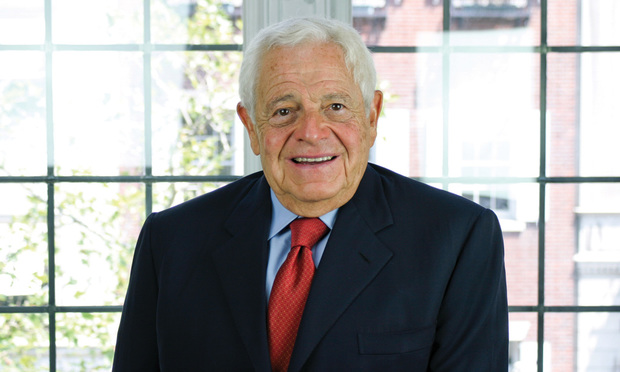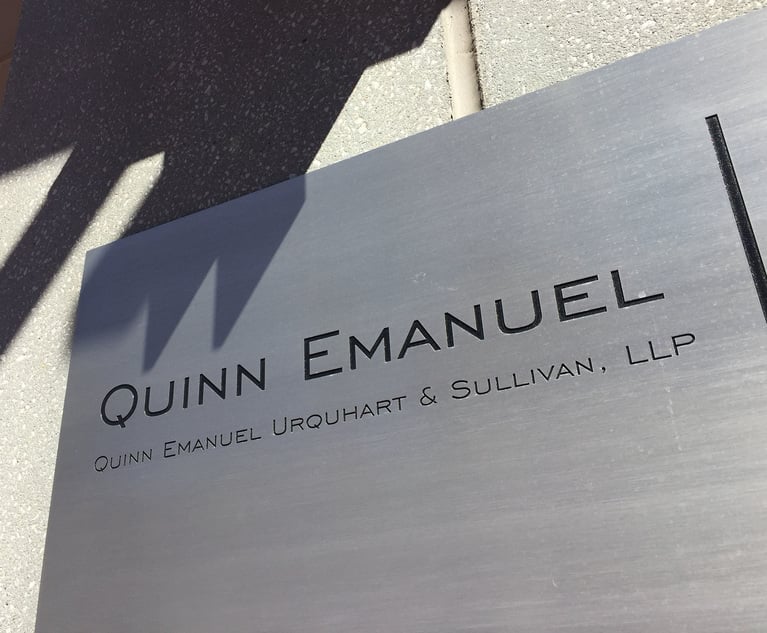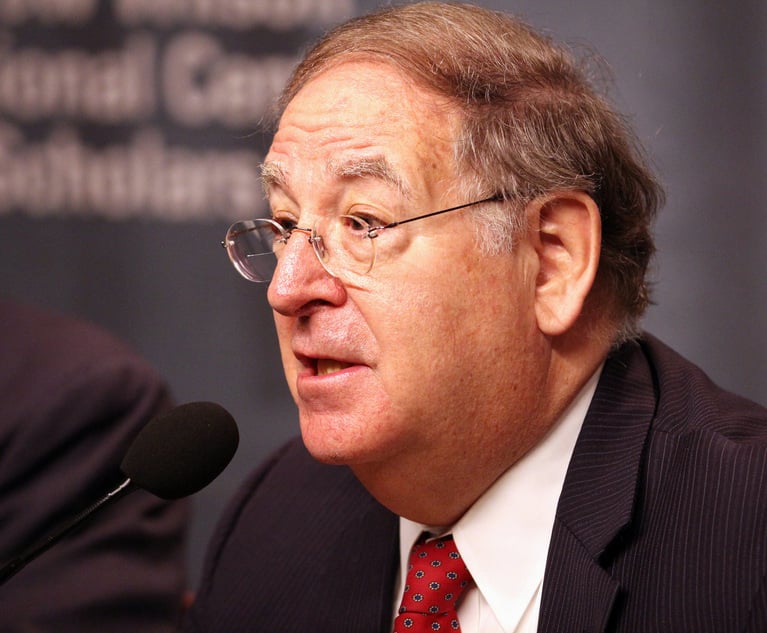Court Acts to Freeze Assets of Chesley, Ex-'Master' of Mass Torts
An appeals court has upheld an injunction freezing the assets of Stanley Chesley—once known as the "master of disaster" for his work in mass tort litigation—after concluding that the disbarred Cincinnati plaintiffs attorney is likely to continue what it called a “high-stakes shell game.”
June 01, 2018 at 05:36 PM
6 minute read
 Stanley Chesley.
Stanley Chesley.
An appeals court has upheld an injunction freezing the assets of Stanley Chesley—once known as the “master of disaster” for his work in mass tort litigation—after concluding that the disbarred Cincinnati plaintiffs attorney is likely to continue what it called a “high-stakes shell game.”
In the latest chapter of a saga that began two decades ago, the U.S. Court of Appeals for the Sixth Circuit on Thursday upheld a district judge's injunction freezing Chesley's assets as part of a case brought by his former clients who are attempting to collect on a $42 million judgment from a Kentucky state court. The payments come from a $200 million settlement in 2001 over the diet drug cocktail fen-phen in which Chesley and several of his co-counsel were accused of pocketing the funds. The former clients brought a fraudulent conveyances action in federal court against Chesley's former firm and a Cincinnati attorney in charge of his assets.
The panel upheld the order even after the Ohio Supreme Court on Oct. 5 struck down an attempt to transfer Chesley's assets to Ohio probate court—the target of the injunction—because it was part of a “misuse of the judicial process.”
Chesley has “offered us no reason to trust that he will discontinue his years-long scheme to avoid the $42 million judgment,” Sixth Circuit Senior Judge Richard Suhrheinrich wrote. “The central focus of that scheme has been to ship all of his money away to places safe from the plaintiffs' reach but still within his control. If we were to lift the injunction, he would be free to continue doing that, which raises the same concerns about his judgment creditors' ability to recover what they are owed.”
Donald Rafferty of Cohen, Todd, Kite & Stanford in Cincinnati, an attorney for Chesley's former firm, Waite, Schneider, Bayless & Chesley—which is no longer practicing and in wind-down mode—and Thomas Rehme, the Cincinnati attorney in charge of Chesley's assets, did not respond to a request for comment.
Angela Ford of Ford Law PSC in Lexington, Kentucky, who represents Chesley's former clients, said in an emailed statement: “The Sixth Circuit wrote with impressive clarity, and I'm hoping the speed with which the court acted will create a sense of urgency in the district court. After nearly 14 years, it's about time for the machinations to end.”
Chesley was a prominent plaintiffs attorney in the mass tort bar. In addition to fen-phen, he got a $200 million settlement in 1983 for Vietnam War veterans exposed to Agent Orange; a $3.2 billion settlement with Dow Corning in 1998 for women claiming diseases caused by silicone breast implants; and a $2.7 billion settlement in 2003 with the government of Libya for families of victims of Pan Am Flight 103, destroyed by a bomb over Scotland.
In the case over fen-phen—a combination of the appetite-suppressing drugs fenfluramine and phentermine—his clients, who were supposed to get about $134 million from the settlement, received $74 million instead, says the Sixth Circuit's opinion. The rest went to their lawyers, including Chesley, who ended up with about more than $20 million, according to his 2013 disbarment proceeding in Kentucky.
“The lawyers, at least for the time being, made out like bandits,” according to the opinion.
But former clients suing over the missing funds won the $42 million judgment. And two of Chesley's co-counsel, Shirley Cunningham Jr. and William Gallion, got prison sentences in 2009 of 20 and 25 years, respectively.
In 2013, the Kentucky Supreme Court disbarred Chesley, who subsequently retired from practicing law in Ohio. It was then that Chesley set up a “wind-up agreement” with Rehme as part of the dissolution of his law firm: “Ostensibly, the agreement's purpose was to help wind up WSBC's business en route to dissolving the firm,” the opinion says. “It also served as a vessel through which Chesley could move his assets.”
Before U.S. District Judge Robert Cleland of the Southern District of Ohio issued his injunction in the federal fraudulent conveyances suit, Rehme transferred the assets in 2016 to a newly formed trust, which moved them to a third party “for the purpose of instituting an assignment for the benefit of creditors action” in Ohio probate court.
In their appeal, Chesley's former firm and Rehme argued that the transfers were for legitimate purposes, particularly since Chesley could no longer practice law, and that Cleland had violated the Anti-Injunction Act by issuing his order against an Ohio state court. After the Ohio Supreme Court ruling, however, the Sixth Circuit asked both sides to provide supplemental briefs on its impact.
Chesley's former firm and Rehme argued that the decision mooted the injunction's purpose, but the former clients said it only reaffirmed Cleland's reasons for imposing the order in the first place.
The Sixth Circuit agreed with the plaintiffs, calling the Ohio Supreme Court's decision “strong evidence of Chesley's pattern of fraudulent behavior.” The panel also noted evidence that Rehme wrote Chesley $5.4 million worth of checks for things like personal legal bills and household expenses and that the timing of the asset transfer “bolsters the suspicion that it was an attempt to evade the plaintiffs.”
In a footnote, the panel noted other “red flags,” such as Chesley's former firm selling 33 cars insured for more than $5 million to his wife, U.S. District Judge Susan Dlott of the Southern District of Ohio, for $543,000, then buying them back for the same price, and a $1 million check in 2014 to “Cory Kumler,” who turned out to be his wife. “These transactions are curious, as there appears to have been no exchange of economic benefit,” the footnote says.
Moreover, Chesley's actions have gone on for two decades, according to the panel.
“There is a fundamental public interest in ending such abuse of the judicial system, in conserving judicial resources, and in preventing further confusion and disruption in this litigation,” the panel wrote.
This content has been archived. It is available through our partners, LexisNexis® and Bloomberg Law.
To view this content, please continue to their sites.
Not a Lexis Subscriber?
Subscribe Now
Not a Bloomberg Law Subscriber?
Subscribe Now
NOT FOR REPRINT
© 2025 ALM Global, LLC, All Rights Reserved. Request academic re-use from www.copyright.com. All other uses, submit a request to [email protected]. For more information visit Asset & Logo Licensing.
You Might Like
View All
Trump Administration Faces Legal Challenge Over EO Impacting Federal Workers
3 minute read
Private Equity Giant KKR Refiles SDNY Countersuit in DOJ Premerger Filing Row
3 minute read
Quinn Emanuel Files Countersuit Against DOJ in Row Over Premerger Reporting
3 minute read
'Thoughtful Jurist': Maryland US District Senior Judge Messitte Dies After Short Illness
4 minute readTrending Stories
Who Got The Work
J. Brugh Lower of Gibbons has entered an appearance for industrial equipment supplier Devco Corporation in a pending trademark infringement lawsuit. The suit, accusing the defendant of selling knock-off Graco products, was filed Dec. 18 in New Jersey District Court by Rivkin Radler on behalf of Graco Inc. and Graco Minnesota. The case, assigned to U.S. District Judge Zahid N. Quraishi, is 3:24-cv-11294, Graco Inc. et al v. Devco Corporation.
Who Got The Work
Rebecca Maller-Stein and Kent A. Yalowitz of Arnold & Porter Kaye Scholer have entered their appearances for Hanaco Venture Capital and its executives, Lior Prosor and David Frankel, in a pending securities lawsuit. The action, filed on Dec. 24 in New York Southern District Court by Zell, Aron & Co. on behalf of Goldeneye Advisors, accuses the defendants of negligently and fraudulently managing the plaintiff's $1 million investment. The case, assigned to U.S. District Judge Vernon S. Broderick, is 1:24-cv-09918, Goldeneye Advisors, LLC v. Hanaco Venture Capital, Ltd. et al.
Who Got The Work
Attorneys from A&O Shearman has stepped in as defense counsel for Toronto-Dominion Bank and other defendants in a pending securities class action. The suit, filed Dec. 11 in New York Southern District Court by Bleichmar Fonti & Auld, accuses the defendants of concealing the bank's 'pervasive' deficiencies in regards to its compliance with the Bank Secrecy Act and the quality of its anti-money laundering controls. The case, assigned to U.S. District Judge Arun Subramanian, is 1:24-cv-09445, Gonzalez v. The Toronto-Dominion Bank et al.
Who Got The Work
Crown Castle International, a Pennsylvania company providing shared communications infrastructure, has turned to Luke D. Wolf of Gordon Rees Scully Mansukhani to fend off a pending breach-of-contract lawsuit. The court action, filed Nov. 25 in Michigan Eastern District Court by Hooper Hathaway PC on behalf of The Town Residences LLC, accuses Crown Castle of failing to transfer approximately $30,000 in utility payments from T-Mobile in breach of a roof-top lease and assignment agreement. The case, assigned to U.S. District Judge Susan K. Declercq, is 2:24-cv-13131, The Town Residences LLC v. T-Mobile US, Inc. et al.
Who Got The Work
Wilfred P. Coronato and Daniel M. Schwartz of McCarter & English have stepped in as defense counsel to Electrolux Home Products Inc. in a pending product liability lawsuit. The court action, filed Nov. 26 in New York Eastern District Court by Poulos Lopiccolo PC and Nagel Rice LLP on behalf of David Stern, alleges that the defendant's refrigerators’ drawers and shelving repeatedly break and fall apart within months after purchase. The case, assigned to U.S. District Judge Joan M. Azrack, is 2:24-cv-08204, Stern v. Electrolux Home Products, Inc.
Featured Firms
Law Offices of Gary Martin Hays & Associates, P.C.
(470) 294-1674
Law Offices of Mark E. Salomone
(857) 444-6468
Smith & Hassler
(713) 739-1250










